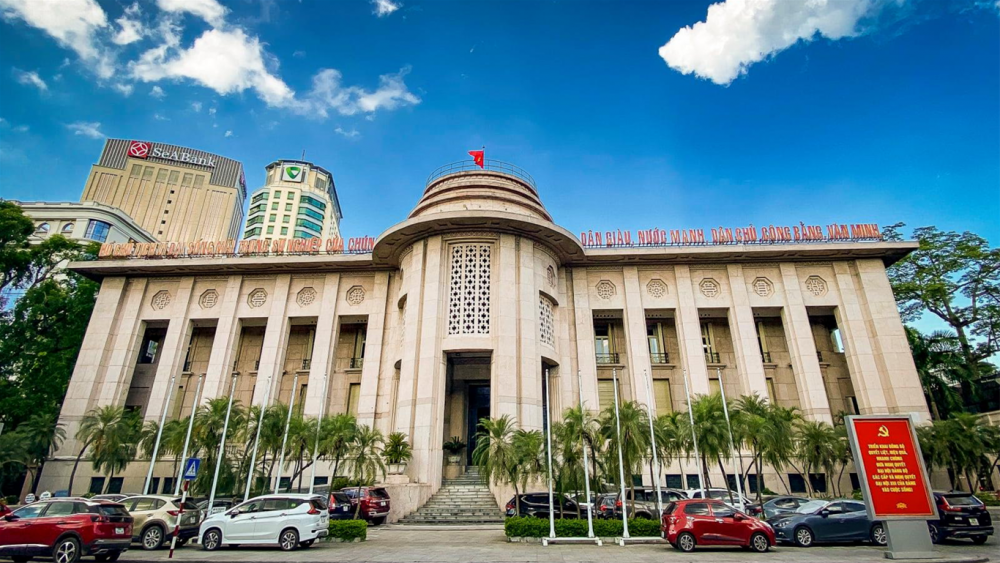Implement many synchronous solutions in CSTT management
In the context of complex fluctuations in the global economy throughout 2024 and the first months of 2025, the State Bank of Vietnam (SBV) has demonstrated a proactive and flexible role in managing monetary policy. By synchronously coordinating management tools, the SBV has contributed to controlling inflation within the target, stabilizing the money and foreign exchange markets, while also consolidating the macroeconomic foundation, ensuring major balances of the economy.
The SBV has flexibly operated open market operations in line with market developments to regulate currency, contributing to stabilizing the money market and implementing monetary policy objectives. Accordingly, the SBV conducts daily term purchase offers of valuable papers through open market operations with appropriate volumes, meeting the capital needs of credit institutions, diversifying and extending the purchase terms to support longer-term capital sources for the system. At the same time, at some point in 2024, in the face of unpredictable developments in the international and domestic markets putting pressure on exchange rates, the SBV issued treasury bills to support exchange rate management and stabilize the foreign exchange market. In the first months of 2025, the SBV continuously reduced the interest rate on issuing treasury bills and stopped issuing treasury bills.
 |
| The State Bank of Vietnam has implemented many management solutions, contributing to stabilizing the monetary market and ensuring major balances of the economy. |
At the same time, continue to maintain operating interest rates at a low level to guide the market to reduce lending interest rates to support businesses and people; at the same time, continue to direct credit institutions to reduce operating costs, increase the application of information technology, digital transformation and other solutions to strive to reduce lending interest rates; organize direct work and issue official dispatches to direct the entire credit institution system to stabilize deposit interest rates and reduce lending interest rates to contribute to promoting economic development.
Thanks to the prompt and drastic direction of commercial banks, the lending interest rate continues to decrease; credit institutions have published lending interest rate information on their websites to provide more information for customers to refer to when accessing loans. As of April 10, 2025, the average lending interest rate for new transactions of commercial banks is 6.34%/year, down 0.6%/year compared to the end of 2024.
Regarding exchange rates and the foreign exchange market, the SBV said that it is currently under great, multi-dimensional and rapidly changing pressure due to unpredictable international economic and political developments, especially the US government's tariff policy, and the rapidly fluctuating international USD, putting pressure on currencies. In that context, the SBV flexibly manages exchange rates, coordinates monetary policy tools (regulating liquidity and interest rates) and intervenes when necessary to stabilize the foreign exchange market, contributing to stabilizing the macro economy and controlling inflation. As a result, the foreign exchange market remains stable, foreign exchange liquidity is smooth, the legitimate foreign currency needs of the economy are fully and promptly met; the VND exchange rate fluctuates in both directions, in line with the general trend of international currencies against the USD. As of April 22, 2025, the exchange rate was around 25,896 VND/USD, up 1.64% compared to the end of 2024.
According to the SBV, the results of monetary policy management contributed to controlling inflation. In 2024, Vietnam's inflation was under increasing pressure in the first half of the year due to the impact of the trend of increasing food prices following world prices, electricity prices, healthcare , and housing rents; however, the decrease in energy prices and more stable food prices since the beginning of the third quarter caused inflation to slow down (inflation compared to the same period in December 2024: 2.94%; July 2024: 4.36%; December 2023: 3.58%). The SBV assessed that inflationary pressure was under control, as shown in the following figures: On average for the whole year of 2024, general inflation was 3.63% - lower than the set target; core inflation was 2.71%, - lower than general inflation.
Entering the first quarter of 2025, domestic inflation continues to be well controlled in the context of pressure from rising food prices, adjustments to state-managed goods and services (electricity, healthcare), as well as seasonal factors such as holidays and Tet. In addition, the decrease in domestic gasoline prices following the world price trend is also one of the supporting factors helping to reduce inflationary pressure in the first quarter of 2025. On average, in the first 3 months of 2025, general inflation is 3.22%; core inflation is 3.01%.
In general, the State Bank has operated monetary policy tools synchronously and flexibly to regulate currency in order to stabilize the monetary market. In practice, the State Bank and the Ministry of Finance also regularly exchange information on the monetary market, the government bond market, and the State Treasury's treasury management to enhance coordination between monetary policy management and fiscal policy.
Pressure from complex factors in the international market
Despite many achievements, the State Bank of Vietnam still finds it difficult to manage monetary policy due to the complicated context of the domestic and international economic situation.
Specifically, inflation has potential pressure to increase in the context of the large openness of Vietnam's economy, fluctuations in world commodity prices due to the impact of complex geopolitical developments, increasing trends in trade protectionism, food security in countries, roadmap for adjusting prices of goods and services managed by the State, climate change and extreme weather events, etc.
 |
| Pressure in monetary policy management due to unpredictable developments in the global economy |
The State Bank also explained that interest rates have been under pressure for many reasons.
First, lending interest rates have tended to decrease sharply in recent times.
Second, the demand for credit capital for production, business and consumption is expected to increase strongly in the coming time to meet the economic growth target in 2025, while capital mobilization of the entire credit institution system may be affected and compete with other investment channels (such as real estate, stock market).
Third, the world interest rate level tends to decrease but remains high and the global financial market is unpredictable after the US announced its reciprocal tax policy.
In addition, in the near future, exchange rates and foreign exchange markets are likely to continue to be under great pressure from complex factors in the international market (the Trump Administration's tariff policies are expected to have a negative impact on the global economy; the Fed's unpredictable monetary policy roadmap; geopolitical developments, commodity price shocks, etc.) and domestic difficulties (the difference in VND and USD interest rates, the economy's high demand for foreign currency, etc.).
Regarding the orientation in the coming time, the State Bank will continue to closely follow market developments and the domestic and foreign economic situation to operate monetary policy proactively, flexibly, promptly, effectively, and in a synchronous, harmonious, and close coordination with fiscal policy and other policies, contributing to prioritizing the strong promotion of economic growth associated with maintaining macroeconomic stability, controlling inflation, and ensuring major balances of the economy.
Source: https://thoibaonganhang.vn/nhnn-dieu-hanh-dong-bo-linh-hoat-cac-giai-phap-nham-on-dinh-thi-truong-tien-te-163771.html


![[Photo] Panorama of the Opening Ceremony of the 43rd Nhan Dan Newspaper National Table Tennis Championship](https://vphoto.vietnam.vn/thumb/1200x675/vietnam/resource/IMAGE/2025/5/19/5e22950340b941309280448198bcf1d9)

![[Photo] General Secretary To Lam attends the conference to review 10 years of implementing Directive No. 05 of the Politburo and evaluate the results of implementing Regulation No. 09 of the Central Public Security Party Committee.](https://vphoto.vietnam.vn/thumb/1200x675/vietnam/resource/IMAGE/2025/5/19/2f44458c655a4403acd7929dbbfa5039)
![[Photo] President Luong Cuong presents the 40-year Party membership badge to Chief of the Office of the President Le Khanh Hai](https://vphoto.vietnam.vn/thumb/1200x675/vietnam/resource/IMAGE/2025/5/19/a22bc55dd7bf4a2ab7e3958d32282c15)

![[Photo] Close-up of Tang Long Bridge, Thu Duc City after repairing rutting](https://vphoto.vietnam.vn/thumb/1200x675/vietnam/resource/IMAGE/2025/5/19/086736d9d11f43198f5bd8d78df9bd41)



















![[Photo] Prime Minister Pham Minh Chinh inspects the progress of the National Exhibition and Fair Center project](https://vphoto.vietnam.vn/thumb/1200x675/vietnam/resource/IMAGE/2025/5/19/35189ac8807140d897ad2b7d2583fbae)






























































![[VIDEO] - Enhancing the value of Quang Nam OCOP products through trade connections](https://vphoto.vietnam.vn/thumb/402x226/vietnam/resource/IMAGE/2025/5/17/5be5b5fff1f14914986fad159097a677)



Comment (0)